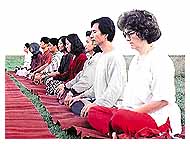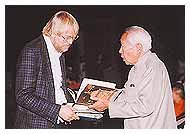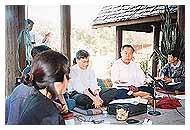|
When the spirit moves you
Alone in a forest, away from any sign of civilisation, Kittichai Ngarmchaipisit becomes aware of the slightest movement in his surroundings. He finds that everything in nature fascinates him, be it the gentle swirl of a falling leaf before it touches the ground, or the manoeuvres of a tiny butterfly around the pearls of sweat gathering on his arm. This is one of the fond memories Mr Kittichai cherishes since he joined a course titled "Deep Ecology" organised by the Spirit in Education Movement (SEM). "We spent almost two weeks on a sort of spiritual pilgrimage in a forest up North," explained the 27-year-old social worker who works with northeastern children.
"Part of the programme was to live by yourself without any food and other diversions for a couple of days. No reading and writing, just observing yourself," he said. "When the stomach is empty, the mind becomes clear and free. I have learned how to attune myself to the rhythms of nature." While the methods of "Deep Ecology" may appear esoteric, other courses offered by SEM are directed more towards dealing with current social problems. They range from lectures on alternative economics, workshops on how to foster model communities and peaceful ways to resolve conflicts, to an intensive three-month programme in which young village leaders from the Forum of the Poor lived together and learned about politics. Founded in 1995, SEM is a non-profit organisation aimed at providing an alternative education to the Thai people. Its driving force, Mr Sulak Sivaraksa, has long criticised mainstream schooling for producing people who are intellectually smart and competitive, but also selfish and unconcerned about the society. "Why not give each and every new-born baby a PhD so they can stop worrying about a degree and really start learning something," Mr Sulak wrote a few years ago. Observed Mr Phipob Dhongchai, another SEM founding member: "Even schools and colleges that are supposed to offer alternative education end up becoming places for the privileged and alienate themselves from the communities they are in." After winning the Right Livelihood Award, also known as the "Alternative Nobel Prize", in 1995 Mr Sulak used the 1.5 million baht prize money to get the SEM educational fund off the ground. The acronym, SEM, is partly in honour of Dr Sem Pringpuangkaew, a physician widely respected for his dedication to treating the country's poor. Mr Sulak's aspiration in spearheading the SEM project is to revive what he claims is the traditional spirit of Thai education called "Trai Sikkha" (the three fundamentals of the learning process). They are sila (virtuous conduct), samadhi or bhavana (concentration or meditation), and panna (wisdom). Each course at SEM, particularly those that require a few days' living-in, is designed to give participants not so much a chunk of knowledge to take away with them as an example of a way of life. There are meditation sessions at dawn and dusk, and a special period for "public service" scheduled each day. Here, participants as well as teachers are expected to contribute their time and labour to cleaning, cooking, dishwashing or tending small vegetable plots around the Ashram Wongsanit in Nakorn Nayok province where many of the courses have been held. "We emulate the Schumacher College where even the principal helps clean the toilets," explained Mr Pracha Hutanuwat, who has led a few SEM courses at the Ashram. The Schumacher College in England offers similar courses to SEM such as "Ecology for the Future World", "Politics Toward Change" and "Art for Spiritual Refinement". Some instructors from the college have come to Thailand to oversee courses for SEM. Mr Phipob added that one advantage of a live-in course is that students can "check whether the teachers practice what they preach. A good example would be Phra Paisarn." Phra Paisarn Wisalo is a former social activist turned monk. He has led several workshops on Buddhist ways to mediate and resolve conflicts, deep ecology, and how to abandon consumeristic lifestyles. The non-hierarchical nature of SEM extends to the background of teachers. Although some are university graduates, a few are simply villagers who have an intuitive understanding of, or personal experience with ecological or rural problems. Among the latter is Joni Odoshao, a Karen elder who has led several conservation projects in the northern forest, and Wibul Khemchaloem, who has turned his back on commercial agriculture and is now acknowledged as an expert in agro-forestry and Thai herbal medicine. Some of the "imported" teachers have also been engaged in social projects. For example, John McConnell who leads a course on Buddhist mediation and conflict resolution has worked in Sri Lanka as a mediator. Elizabeth Roberts and Elias Armidon, the main instructors for the "Deep Ecology" course, are environmental activists and founders of the Institute of Deep Ecology Education in Boulder, Colorado. Referred to as "facilitators", the teachers act more as guides who accompany the students on a search into themselves rather than delivering pre-packaged knowledge. "The conventional way is to look at each person as an empty glass waiting to be filled," noted Mr Kittichai. "But at SEM, everyone is given respect that they already come to the class with something. There is no right or wrong answer - each of us just shares what we know with others. This is a very useful attitude especially when you work with villagers." "In many cases, the society has dictated that what you know is meaningless," added Mr Pracha. "But here we listen to each individual and we emphasise real-life experience. "A few villagers told us now they know that their bamboo huts are in fact very ecologically friendly. So is the idea of chemical-free farming." A typical class at SEM sees participants actively engaging in discussion, be they monks and nuns, villagers and hilltribe people, NGO staffers, students, doctors or businesspeople.
Although the general public can join any class - there is no educational prerequisite besides a curiosity to learn - some subjects such as those on community building, deep ecology and peaceful mediation involve several levels and must be attended in a step-by-step manner. Such courses tend to be relatively long, about one week on average. As they require participants to stay together in the same compound, a sense of camaraderie grows, enhanced by a few activities designed by the instructors. "In another course I took on community building, we gradually learned to respect and trust members of the group, enough to confide secrets that had been plaguing each of us," recalled Mr Kittichai. "It helped dissolve our egos and complexes. We become a group that was not just there to work together, but to help each other." According to Mr Kittichai, the benefits of attending an SEM programme is not only confined to the personal but extends into the public arena as well. As an NGO worker, he has been promoting peaceful ways for villagers to voice their problems to the public and state agencies. A group of youths that Mr Kittichai is working with has launched a campaign to raise questions on whether or not a dam should be built in their village. Another concrete application of the programmes is creating an "ecological map". Villagers are asked to record the places they like or consider to be the hub of the community, as well as where natural resources are available in their local area. The map will be updated over the years and Mr Kittichai hopes the comparison of changes on paper will raise the local people's awareness of the need to conserve the environment. In the spiritual realm, Mr Pracha, a former monk himself, said monks and nuns who have attended SEM courses have returned to their communities with better tools for preaching. They learned to link various religious teachings to better analyse social problems, something they didn't seem to find in the ecclesiastical education system. "A few monks and nuns say they feel more confident to convey dharma to their people back home," said Preeda Ruengwichatorn of the Sekiyatham group, another initiative of Mr Sulak. SEM has been working closely with the Sekiyatham group, which comprises Thailand's progressive monks engaged in social reform and environmental conservation movements. And according to Mr Preeda, some younger monks at Suan Mok Temple, likewise known for their relatively liberal outlook, have adopted the SEM curriculum to conduct workshops with their peers. Be it in the secular or religious realm, SEM hopes to be, in Mr Pracha's words, a catalyst or breeding ground for a new generation of leaders. An initiative early this year to conduct a workshop for young leaders from the Forum of the Poor is one such attempt. Over a three-month period, participants learned about the historical development of Thai politics, why the leftist movements (of peasants, workers, students and the Communist Party) have failed, and the significance of the new Constitution which allows them to assert their rights. "These villagers already know what their problems are," explained Mr Pracha. "We only provide them with the macro-picture, to get them to look beyond the immediate and specific issues such as land compensation, and to link their problems to the inherent flaws in the social structure. "Actually, this will help the government in the long run. To make it more accountable and legitimate as an institution that serves the people rather than big businesses." Similar projects have been conducted in neighbouring countries with the aim of creating a network among local leaders in the region. But despite their lofty aspirations and hard work, after three years in operation SEM continues to find itself in a marginal position. It seems to have an appeal to a very limited circle - those who are regarded as a little "unusual" or even "crazy", according to one participant. "It's as if we belong to two different worlds," Mr Phipob lamented. "I'm puzzled myself that during this economic crisis when a lot of people are going back to school, why they continue taking the same subjects - MBA courses - which would perpetuate the same old attitudes and problems."
However, certain individuals at mainstream educational institutions have considered incorporating the SEM curriculum into their own courses. A Rajabhat College in Ratchaburi province is planning to launch an ashram for education for life. Yet SEM's ultimate target of sparking reform of fundamental ideas on a large scale looks remote. "The process of changing people's ideas, of course, takes a long, long time," said Mr Pracha. "But we believe that a radical change will come to the world sooner or later, as more and more people become disillusioned with the present consumeristic way of life. "We may not look like a fancy institution. In fact, we sometimes don't have any baht left in our pockets. It's a wonder sometimes how we manage to keep things running. Perhaps it's faith and support from our friends around the world," Mr Pracha concluded. Info for donations: Name of organisation: Spirit in Education Movement (SEM) Contact person: Ms Wallapa Khuntiranont Address: 60/2 Soi Tiwanont 34, Tivanont Road, Muang District, Nonthaburi 11000 Telephone: 950-6601-4 Fax: 580-3711 |



